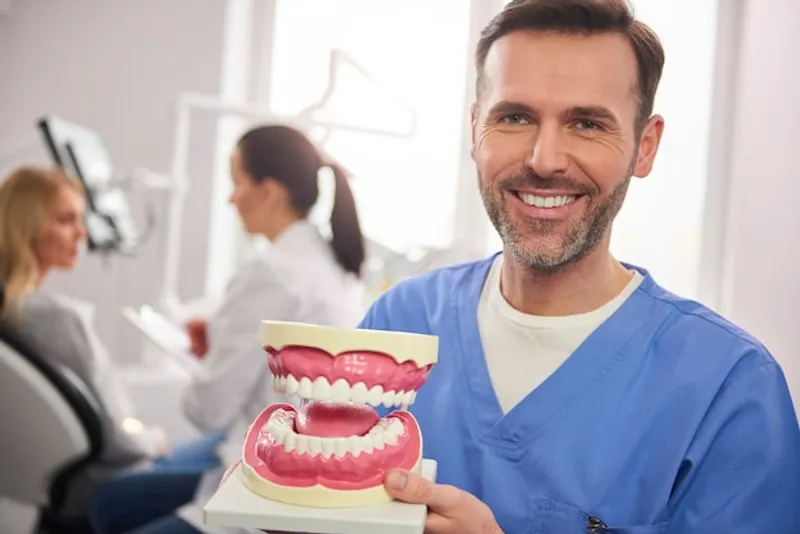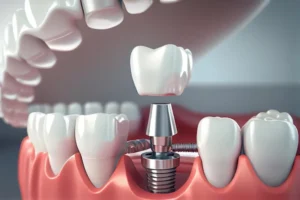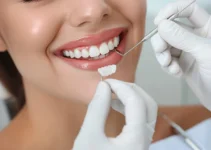Dentures are a time-tested solution for individuals missing one or several teeth, offering a blend of aesthetic appeal and functionality. Apart from restoring a smile, dentures help maintain facial structure and improve chewing capability, which can positively impact nutrition and overall health. Customizable to each person’s dental anatomy, modern dentures are more comfortable and natural-looking than ever before, providing an accessible option for those looking to enhance their oral health and quality of life.
Understanding Dentures
When it comes to replacing missing teeth, dentures have been a reliable and effective solution for many years. Understanding the various options and advancements in denture technology can help patients make informed decisions about their oral health. In this article, we will delve into the details of dentures, specifically focusing on what they are and how they can benefit you.
Whether you are considering dentures for the first time or looking to upgrade your current set, it is important to be well-informed. Dentures not only improve oral function but also enhance aesthetic appeal, contributing to a boost in self-confidence. Let’s explore what dentures are and the benefits they offer.
What are Dentures?
Dentures are removable prosthetic devices designed to replace missing teeth and surrounding tissues. They are typically made from a combination of materials such as acrylic resin, metal, and sometimes porcelain. Dentures are custom-made to fit the individual patient’s mouth, ensuring a comfortable and natural appearance.
There are two main types of dentures: complete dentures and partial dentures. Complete dentures are used when all the teeth are missing in an arch, either upper or lower, while partial dentures are used when some natural teeth remain. 
Modern advancements in denture technology have led to more natural-looking and durable options. Innovations such as implant-supported dentures offer added stability and comfort, making them a popular choice among patients. These advancements ensure that dentures not only restore the function of natural teeth but also provide a more lifelike appearance.
Choosing the right type of denture depends on various factors, including the number of missing teeth, the condition of the remaining teeth, and the overall health of the patient’s gums and jawbone. Your dentist can help you determine the best option for your unique situation.
Types of Dentures
When it comes to replacing missing teeth, there are several denture options available to suit different needs and preferences. Understanding the various types of dentures can help you make an informed decision about which solution might be best for you. In this section, we will explore three primary categories: complete dentures, partial dentures, and implant-supported dentures. Each type of denture comes with its own set of benefits and considerations. Factors such as the extent of tooth loss, the condition of your jawbone, and your personal preferences all play a role in determining the most suitable denture type. By gaining a comprehensive understanding of these options, you can work with your dental professional to achieve the best outcome.
Complete Dentures
Complete dentures, also known as full dentures, are designed for individuals who have lost all of their natural teeth in either the upper or lower jaw, or both. These dentures consist of a full set of artificial teeth attached to a gum-colored acrylic base that fits snugly over your gums. They rely on suction and/or denture adhesives to stay in place, offering a non-invasive solution for total tooth replacement.
One of the primary advantages of complete dentures is that they are cost-effective and relatively quick to fabricate. However, they do come with some limitations, such as the potential for them to become loose or shift while eating or speaking. Proper care and regular adjustments by your dentist are essential to maintaining their fit and comfort.
Partial Dentures
Partial dentures are an excellent solution for individuals who still have some of their natural teeth remaining. These dentures consist of a metal or acrylic framework that holds one or more artificial teeth, filling in the gaps left by missing teeth. Partial dentures help prevent the remaining natural teeth from shifting out of place and maintain proper alignment.
One significant benefit of partial dentures is that they are often more stable and secure than complete dentures since they are anchored to the remaining natural teeth. This stability can improve the overall functionality and comfort of the dentures. Additionally, partial dentures are typically more affordable than other tooth replacement options like dental implants.
Implant-Supported Dentures
Implant-supported dentures represent one of the most advanced and effective solutions for tooth replacement. These dentures are anchored to dental implants, which are surgically placed into the jawbone. The implants provide a stable and secure foundation for the dentures, offering superior functionality and comfort compared to traditional dentures.
One of the main advantages of implant-supported dentures is their ability to preserve jawbone density. Traditional dentures can accelerate bone loss over time, but dental implants stimulate the jawbone similar to natural tooth roots, helping to maintain its structure and health. This can lead to a more youthful facial appearance and better overall oral health.
While implant-supported dentures tend to be more expensive and require a longer treatment timeline, the benefits they offer in terms of comfort, stability, and bone preservation make them a highly desirable option for many patients. Proper care and regular dental check-ups are essential to ensure the longevity and success of implant-supported dentures.
In conclusion, whether you are considering complete dentures, partial dentures, or implant-supported dentures, it is crucial to consult with your dental professional to determine the best option for your specific needs. Each type of denture offers unique benefits and considerations, and understanding these can help you make an informed decision. Feel free to explore our other articles to learn more about dental health and the latest advancements in dental treatments.
Benefits of Dentures
Dentures offer a multitude of benefits that can significantly improve the quality of life for individuals with missing teeth. One of the most immediate advantages is the restoration of a natural-looking smile, which can vastly enhance a person’s self-esteem. Additionally, dentures play a crucial role in maintaining oral health, as they help to prevent the remaining teeth from shifting out of place. This can reduce the risk of more severe dental issues down the road.
Another notable benefit of dentures is their ability to restore chewing and speaking functions. When teeth are missing, it becomes challenging to chew food properly, leading to dietary restrictions and possible nutritional deficiencies. Dentures address this problem by providing a stable surface for chewing, thereby enabling a balanced diet. Moreover, they help in articulating speech more clearly, reducing any speech impediments caused by missing teeth.
Improved Appearance
One of the primary benefits of dentures is the remarkable improvement in appearance they offer. Missing teeth can considerably alter the structure of your face, making it appear sunken and aged. Dentures provide the necessary support to your facial muscles, helping to restore a youthful look. This boost in aesthetic appeal can significantly impact your confidence and social interactions.
Moreover, modern dentures are designed to mimic the natural look of your teeth, making them virtually indistinguishable from real teeth. They come in various shades and styles to match your natural teeth and gums, ensuring a seamless and natural appearance. With advancements in dental technology, dentures today are not only functional but also aesthetically pleasing.
Enhanced Oral Function
Another significant benefit of dentures is the enhancement of oral function. When you lose teeth, chewing becomes a complicated process, often leading to inadequate nutrition. Dentures help solve this problem by providing a stable surface for chewing, enabling you to enjoy a variety of foods that you might have otherwise avoided. This improvement in diet can lead to better overall health and well-being.
Additionally, dentures can improve speech. Missing teeth often cause difficulties in pronouncing certain words, affecting your ability to communicate clearly. By filling the gaps in your teeth, dentures help in forming words correctly, thereby improving your speech. This can have a positive impact on both your personal and professional life, boosting your confidence in social interactions.
Interested in learning more about dentures and other dental solutions? Check out our other articles to stay informed and make the best choices for your oral health.
Frequently Asked Questions About Dentures
If you’re considering dentures as a solution for missing teeth, you likely have a few questions about what to expect. Here’s a common query answered in detail.
What are the types of dentures available?
There are primarily two types of dentures: full dentures and partial dentures. Full dentures are used when all natural teeth are missing, whereas partial dentures are suitable if you still have some natural teeth remaining. Full dentures can provide a complete smile and facial support, and partial dentures are used not only to fill in the gaps created by missing teeth but also to prevent other teeth from changing their positions. Both types can greatly enhance the wearer’s appearance and functionality in terms of speaking and eating.

My name is Salman Kapa, a 73-year-old expert in bone regeneration and dental implantology. With decades of experience in the field, I am dedicated to advancing our understanding of oral health and hygiene. Through my research and writing, I aim to contribute to the development of innovative solutions in dental care.




